Fleurs du Mal Magazine


Or see the index
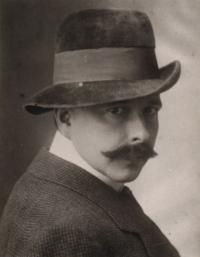 Antony Kok (1882 – 1969)
Antony Kok (1882 – 1969)
Antony Kok, was met Theo van Doesburg en Piet Mondriaan oprichter en medewerker van het avant-gardistische kunsttijdschrift De Stijl (1917 – 1932). Hij was vooral actief als dichter en schrijver van aforismen.
Kees Verwey (1900 -1995)
Tijdens zijn leven, dat bijna een eeuw beslaat, maakte de kunstenaar verschillende ontwikkelingen in de schilderkunst mee. Al op jonge leeftijd kwam hij in aanraking met het werk van George Breitner en Floris Verster. Ook werd hij beïnvloed door Franse (post-)impressionisten en later door de moderne kunst van o.a. Karel Appel en Pablo Picasso. Omringd door de kunst van zijn idolen wordt in deze nieuwe tentoonstelling de enorme vaardigheid en veelzijdigheid van de schilder Verwey duidelijk.
Na hun ontmoeting (in Haarlem in 1953) verklaarde Kees Verwey:
‘Antony Kok had me te pakken. Ruim een jaar ben ik met die ene man bezig geweest. Je zou zeggen dat zoiets ondenkbaar is, maar ik kon niet buiten de visie op die man. Het was een proces dat niet meer kon worden tegengehouden. Ik heb hem er wel eens over ondervraagd, toen zei hij: maar jij hebt die tekeningen niet gemaakt, ik heb ze gemaakt.’
In het eerste jaren van hun kennismaking maakte Verwey meer dan 30 portretten van Kok. De eerste serie zou begin jaren vijftig worden tentoongesteld in Amsterdam, Rotterdam en Haarlem. In 1955 was de serie uitgegroeid tot 40×1 en in Eindhoven te zien.
Lees meer over Kees Verwey, zijn vrienden en favoriete kunstenaars, zoals Karel Appel, Pablo Picasso, Edouard Vuillard, Floris Verster en Antony Kok in de bij de tentoonstelling verschenen publicatie:
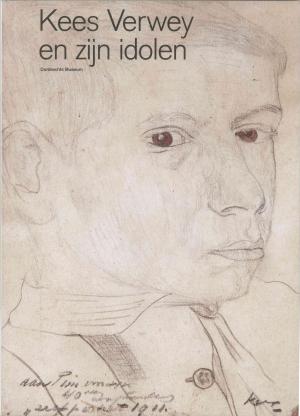
Kees Verwey
en zijn idolen
Dordrechts Museum
2019
ISBN 978-90-71722-30-1
Redactie: Laura van den Hout, Judith Spijksma, Linda Janssen
Publicatie ter gelegenheid van de tentoonstelling ‘Kees Verwey en zijn idolen’, die van 14 juli 2019 tot en met 5 januari 2020 plaatsvindt in het Dordrechts Museum. De tentoonstelling kwam tot stand in samenwerking met Stichting Kees Verwey.
I N H O U D
6
Max van Rooy
Portretten als stillevens en het atelier als goudmijn
12
Karlijn de Jong
De moeder van de moderne kunst
Kees Verwey en De Onafhankelijken
22
Tijdlijn
26
Barbara Collé
Kijk ik naar de een, dan vlamt de ander
Over kleurenparen in Moeders theetafel en Het gele jakje van Kees Verwey, en Stilleven met boeken van Henri Frédéric Boot
34
Iduna Paalman
Sigaretje
36
Ester Naomi Perquin
Bes
38
Maartje Smits
Door je kind getekend
40
Maarten Buser
Pirouettes draaien op een idee
Kees Verwey en de literatuur
46
Jorne Vriens
Gekoesterde intimiteit
50
Max van Rooy
De onderzoekende kracht van het kijken
54
Sascha Broeders
De kunstenaar en de museumdirecteur
Kees Verwey volgens Jup de Groot, voormalig directeur van het Dordrechts Museum
56
Hanneke van Kempen en Jef van Kempen
‘Antony Kok had me te pakken’
66
Sandra Kisters
Het atelier van Kees Verwey – een kristal met vele facetten
75
Biografieën
76
Colofon
Tentoonstelling van 6 juli 2019 t/m 5 januari 2020
Kees Verwey en zijn idolen
Over Karel Appel, Pablo Picasso, Edouard Vuillard, Floris Verster, Antony Kok e.a.
Dordrechts Museum
Museumstraat 40, Dordrecht
3311 XP Dordrecht
www.dordrechtsmuseum.nl
‘Antony Kok had me te pakken’ sprak Kees Verwey
fleursdumal.nl magazine
More in: - Book News, - Book Stories, Antony Kok, Archive K-L, Archive W-X, Art & Literature News, DADA, Dada, De Stijl, Exhibition Archive, FDM Art Gallery, Hanneke van Kempen, Jef van Kempen, Kees Verwey, Kok, Antony, Piet Mondriaan, Theo van Doesburg
An exciting new collection of the essential writings of surrealism, the European avant-garde movement of the mind’s deepest powers 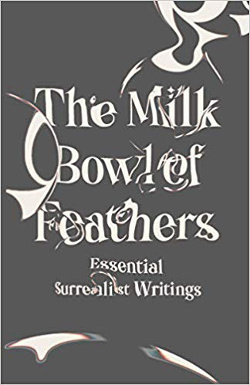 Originating in 1916 with the avant-garde Dada movement at the famous Café Voltaire in Zurich, surrealism aimed to unleash the powers of the creative act without thinking. Max Ernst, André Breton, Tristan Tzara, Paul Éluard, Philippe Soupault, and Louis Aragon created a movement that spread wildly to all corners of the globe, inspiring not only poetry but also artists like Joan Miro and René Magritte and cinematic works by Antonin Artaud, Luis Bunuel, and Salvador Dalí.
Originating in 1916 with the avant-garde Dada movement at the famous Café Voltaire in Zurich, surrealism aimed to unleash the powers of the creative act without thinking. Max Ernst, André Breton, Tristan Tzara, Paul Éluard, Philippe Soupault, and Louis Aragon created a movement that spread wildly to all corners of the globe, inspiring not only poetry but also artists like Joan Miro and René Magritte and cinematic works by Antonin Artaud, Luis Bunuel, and Salvador Dalí.
As the editor, Mary Ann Caws, says, “Essential to surrealist behavior is a constant state of openness, of readiness for whatever occurs, whatever marvelous object we might come across, manifesting itself against the already thought, the already lived.”
Here are the gems of this major, mind-bending aesthetic, political, and humane movement: writers as diverse as Aragon, Breton, Dalí, René Char, Robert Desnos, Mina Loy, Paul Magritte, Alice Paalen, Gisele Prassinos, Man Ray, Kay Sage, and Elsa von Freytag-Loringhoven are included here, providing a grand picture of this revolutionary movement that shocked the world.
Title: The Milk Bowl of Feathers
Subtitle: Essential Surrealist Writings
Edited by Mary Ann Caws
Publisher: New Directions
Title First Published 25 September 2018
Format Paperback $13.95
ISBN-10 0811227073
ISBN-13 9780811227070
128 pages
# more books
The Milk Bowl of Feathers.
Essential Surrealist Writings
Edited by Mary Ann Caws
•fleursdumal.nl magazine
More in: - Book News, Art & Literature News, Artaud, Antonin, DADA, Dada, Dadaïsme, Desnos, Robert, Freytag-Loringhoven, Elsa von, Loy, Mina, Surrealism, SURREALISM, Surrealisme, Tzara, Tristan
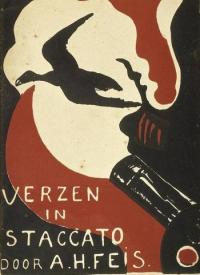
De Soldaat.
Geen mensch.
Geen dier.
Geen plant:
Een ding.
Het mort
noch klaagt:
Zijn kracht
verging.
Het lijdt.
Het sjouwt.
Het torst
gewicht.
Geen vreugd.
Geen lach
op zijn
gezicht.
Vraag.
O mensch,
mijn vriend,
waar gaat
dat heen?
Antwoord.
Het vuur,
de dood,
‘t Is mij
heusch één!
Agnita Feis
(1881 – 1944)
Uit: Oorlog. Verzen in Staccato (1916).
De Soldaat
• fleursdumal.nl magazine
More in: *Concrete + Visual Poetry F-J, *War Poetry Archive, Agnita Feis, Antony Kok, Archive E-F, Archive E-F, DADA, De Stijl, Feis, Agnita, Theo van Doesburg (I.K. Bonset)
More on www.antonykok.nl

More in: Antony Kok, Archive K-L, De Stijl, Essays about Van Doesburg, Kok, Mondriaan, Schwitters, Milius & Van Moorsel, Kok, Antony, Piet Mondriaan, Theo van Doesburg
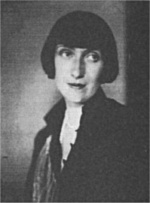
Venus
O Tag der Gnade,
Sieg des frühlinghaften Glänzens!
Da sich das Meer
in dich hineingeliebt,
die schlankste Welle
deine Anmutslinie zog.
Und dann ihr kluges Spiel
auf ewige Zeit
in deine Adern sang,
damit du sein Geheimnis
großen Liebenden erhältst.
Ihr Priesterinnen,
die in Venus Zeichen flammt,
fühlt oft die Sehnsucht
schmerzend nach dem Meere,
und in den höchsten Liebesfesten
Tod und Todesangst.
Du aber Göttin
schwebst unsterblich,
lächelnd über allem –
und mit bestrickender Gebärde
hält deine Hand
die rosige Muschel
des Verschenkens.
Himmel und Qualen
der Jahrtausende!
Francisca Stoecklin
(1894-1931)
Venus
• fleursdumal.nl magazine
More in: Archive S-T, Archive S-T, Stoecklin, Francisca

Oorlog!
Een volk.
Een land:
Het bloeit.
Het geurt.
Eén graf!
Eén brand!
Men rouwt.
Men treurt.
Agnita Feis
(1881 – 1944)
Uit: Oorlog. Verzen in Staccato (1916).
Oorlog
• fleursdumal.nl magazine
More in: *War Poetry Archive, Agnita Feis, Archive E-F, DADA, De Stijl, Doesburg, Theo van, Feis, Agnita, WAR & PEACE
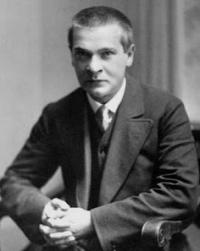
An die Melancholie
Immer wieder kehrst du Melancholie,
O Sanftmut der einsamen Seele.
Zu Ende glüht ein goldner Tag.
Demutsvoll beugt sich dem Schmerz der Geduldige,
Tönend von Wohllaut und weichem Wahnsinn.
Siehe! es dämmert schon.
Wiederkehrt die Nacht und klagt ein Sterbliches
Und es leidet ein anderes mit.
Schaudernd unter herbstlichen Sternen
Neigt sich jährlich tiefer das Haupt.
Georg Trakl
(1887 – 1914)
An die Melancholie, 1913
• fleursdumal.nl magazine
More in: Archive S-T, Trakl, Georg, Trakl, Georg
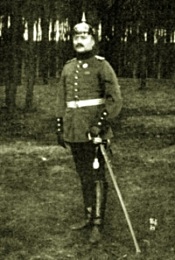
Schön
Wissen Tören
Wahr und Trügen
Mord Gebären
Sterben Sein
Weinen Jubeln
Haß Vergehen
Stark und Schwach
Unmöglich
Kann!
Dein Körper flammt!
Die Welt
Erlischt!
August Stramm
(1874-1915)
Schön, 1914
• fleursdumal.nl magazine
More in: *War Poetry Archive, Archive S-T, Expressionism, Stramm, August
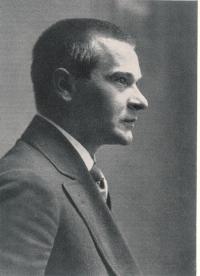
Die junge Magd
1
Oft am Brunnen, wenn es dämmert,
Sieht man sie verzaubert stehen
Wasser schöpfen, wenn es dämmert.
Eimer auf und niedergehen.
In den Buchen Dohlen flattern
Und sie gleichet einem Schatten.
Ihre gelben Haare flattern
Und im Hofe schrein die Ratten.
Und umschmeichelt von Verfalle
Senkt sie die entzundenen Lider.
Dürres Gras neigt im Verfalle
Sich zu ihren Füßen nieder.
2
Stille schafft sie in der Kammer
Und der Hof liegt längst verödet.
Im Hollunder vor der Kammer
Kläglich eine Amsel flötet.
Silbern schaut ihr Bild im Spiegel
Fremd sie an im Zwielichtscheine
Und verdämmert fahl im Spiegel
Und ihr graut vor seiner Reine.
Traumhaft singt ein Knecht im Dunkel
Und sie starrt von Schmerz geschüttelt.
Röte träufelt durch das Dunkel.
Jäh am Tor der Südwind rüttelt.
3
Nächtens übern kahlen Anger
Gaukelt sie in Fieberträumen.
Mürrisch greint der Wind im Anger
Und der Mond lauscht aus den Bäumen.
Balde rings die Sterne bleichen
Und ermattet von Beschwerde
Wächsern ihre Wangen bleichen.
Fäulnis wittert aus der Erde.
Traurig rauscht das Rohr im Tümpel
Und sie friert in sich gekauert.
Fern ein Hahn kräht. Übern Tümpel
Hart und grau der Morgen schauert.
4
In der Schmiede dröhnt der Hammer
Und sie huscht am Tor vorüber.
Glührot schwingt der Knecht den Hammer
Und sie schaut wie tot hinüber.
Wie im Traum trifft sie ein Lachen;
Und sie taumelt in die Schmiede,
Scheu geduckt vor seinem Lachen,
Wie der Hammer hart und rüde.
Hell versprühn im Raum die Funken
Und mit hilfloser Geberde
Hascht sie nach den wilden Funken
Und sie stürzt betäubt zur Erde.
5
Schmächtig hingestreckt im Bette
Wacht sie auf voll süßem Bangen
Und sie sieht ihr schmutzig Bette
Ganz von goldnem Licht verhangen.
Die Reseden dort am Fenster
Und den bläulich hellen Himmel.
Manchmal trägt der Wind ans Fenster
Einer Glocke zag Gebimmel.
Schatten gleiten übers Kissen,
Langsam schlägt die Mittagsstunde
Und sie atmet schwer im Kissen
Und ihr Mund gleicht einer Wunde.
6
Abends schweben blutige Linnen,
Wolken über stummen Wäldern,
Die gehüllt in schwarze Linnen,
Spatzen lärmen auf den Feldern.
Und sie liegt ganz weiß im Dunkel.
Unterm Dach verhaucht ein Girren.
Wie ein Aas in Busch und Dunkel
Fliegen ihren Mund umschwirren.
Traumhaft klingt im braunen Weiler
Nach ein Klang von Tanz und Geigen,
Schwebt ihr Antlitz durch den Weiler,
Weht ihr Haar in kahlen Zweigen.
Georg Trakl
(1887 – 1914)
Die junge Magd, 1913
•fleursdumal.nl magazine
More in: Archive S-T, Trakl, Georg, Trakl, Georg
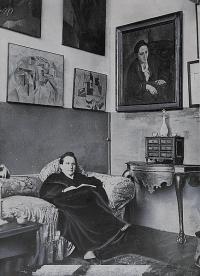 Johnny Grey
Johnny Grey
What did he say. I was disagreeing with him. He said he didn’t have it by his side. He said. Hurry.
Eat it.
I am not going to talk about it. I am not going to talk about it.
Another thing.
This is mentioned. He was silly. He said there would have been many more elevators if it hadn’t been for this war.
He was so thirsty.
They asked him.
Please.
If it weren’t for them there would be wind.
I said there wasn’t.
I said it was balmy.
I said that when I was little I asked for a closet.
This was the way it was written.
I was awed.
It is so injudicious to make plans.
We will not decide about three.
Three is the best way to add.
The bank opens tomorrow.
I was mistaken.
I hope I can continue.
To be a tailor.
The other said nothing.
The other one said he was hindering him and he made that mistake and he would not prepare further.
It is not deceiving.
I can say so gladly.
It’s always better.
It’s wonderful how it always comes out.
Conversational.
Plants were said to bring lining together. This is not deceived. This is not deceived. Plants.
Plants were said to bring meadows springing. Shattering stubbornly in their teeth.
Plants aid sad and not furniture.
This is it.
Plants are riotous.
Not even.
If you give money.
Plants are said to be left out if you give money.
Join or gray.
Points are spoken. This in one. Picturesque. It is just the same.
I cannot freeze.
I understand a picture. It is to have stop it who does. It is to have asked about it the sneezing bell. Bell or better.
A simple extenuation.
I mean to be fine with it.
A picture with all of it bitten by that supper. Call it. I shall please. Nowadays.
I find this a very pleasant pencil. Do I. I find this a very pleasant pencil. Do I find this a pleasant pencil.
How to give soldiers fresh water.
How do you.
You use the echoes.
Dear Jenny.
I am your brother. Nestling.
Nestling noses.
My gay.
Baby.
Little.
Lobster.
Chatter.
Sweet.
Joy.
My.
Baby.
Example.
Be good.
Always.
Six.
Seven.
Eight.
Nine.
All.
The.
Time.
Me.
Extra.
My.
Baby.
Scenes where there is no piece of a let it go.
No I am not pleased with their descriptions.
This is not their year.
Two of them.
Johnny Grey and Eddy.
Why not however.
It was not polite.
A long way.
I understand and I say, I understand him to say that, I see him I say I see him or I say, I say that I understand. What is it. He doesn’t realise. I don’t say that he isn’t there I don’t solidly favor him. I said I was prepared. I was prepared to relieve him. I was prepared to relieve him then or then and I was holding, I was holding anything. I am often for them. They gave it. They were pleased. So pleased and side with it. So pleased and have it. So have it and say it. Say it then. If he was promised, it, he had been left by the belief. He had the action. All old. In it. He was wretched. I do not believe or for it. I do not arouse rubbers. When we went away were we then told to be left with them. Do they or do they do it. Do they believe the truth.
I am beginning. Go on Saturday. I believe for Sunday. We deceived everbody.
I forgot to drink water.
No I haven’t seen it.
He said it.
It’s wonderful.
Target.
They don’t believe it either.
Call it.
That.
Fat.
Cheeks.
By.
That.
Time.
Drenced.
By.
That.
Time.
Obligation.
To sign.
That
Today
When
By
That
Field.
He said he was a Spanish family.
It will make.
A
Terrible
Not terrible.
It will not make that one believe me it is not for my pleasure that I promise it.
No
Neither.
That
Or
Another
Neither
One
Lightly
Widened.
Widened by what.
Not this.
Not left.
Buy
Their
It’s not a country.
I told him so.
I wish to begin.
Lining.
Of that thing.
By that time.
It.
Or.
It.
Was.
How.
We don’t know whom to invite for lunch. You told me you’d tell me. I don’t know.
Either.
I do get wonderful action into them don’t I.
Blame.
Worthy.
Out.
Standing.
Eraser.
That was a seat.
Leave it out.
Seat.
Stretch.
Sober.
Left.
Over.
Curling.
Irresistible.
I come to it at last.
I know what I want.
Call.
Tried.
To be.
Just.
Seated.
Beside.
The.
Meaning.
Please come.
I met.
A steady house which was neither blocking nor behaving as if it would for the road.
He looks like it.
A ladder insults.
Me.
I do stem when in.
I don’t look at them any more.
Johnny Grey.
What did I say.
I said I would leave it.
He was so kind.
That was lasting.
I am so certain.
Please.
It’s remarkable that I can make good sentences.
It reminds me of a play that I remember which is better.
It is better.
Everything.
In.
I am coming.
To it.
I know it.
Please.
Pleased.
Pleased with me.
Pleased with me.
Canvas covers.
I wished to go away.
I asked for an astonishing green I asked for more Bertie.
I asked only once.
Pack it.
Package.
A little leaving.
We went to eat.
I have plenty of food.
Always.
Nearly.
Always.
Certainly.
By an example.
I was never afraid.
He doesn’t say anything.
In that way.
Not after.
He was.
Sure.
Of it.
Then.
By then.
We were.
In Munich.
And sat.
Today.
By way
Of
Staring.
And nearly all of it.
In.
That.
Shining.
Firm.
Spread.
Paul.
Slices.
If I copy nature.
If I copy nature.
If I copy nature.
If I copy nature.
For it.
Open.
Seen
Piling.
Left.
In.
Left in.
Not in.
Border
Sew.
Spaces.
I.
Mean.
To.
Laugh.
Do be.
Do be all.
Do be all out.
If you can.
Come.
To stay.
And.
After.
All.
Have.
A.
Night.
Which.
Means.
That.
There
Is.
Not
This
Essential.
By that way.
It was all out in it.
By this time.
Which was reasonable and an explanation.
We never expected he would tell a lie.
Not this.
For.
More.
To be.
Indians are disappointing.
Not to me.
I was never disappointed in an Indian.
I was never disappointed in an Indian in any way.
How old are you.
Careless.
Heavy all the time.
I know she is.
I am.
Politely.
Finished.
Gertrude Stein
(1874-1946)
Johnny Grey
• fleursdumal.nl magazine
More in: Archive S-T, Archive S-T, Gertrude Stein, Stein, Gertrude

De slag.
De zon.
Een woud.
Een veld.
Een vliet:
‘t Is geel,
groen, blauw,
maar rood
is ‘t niet.
Gerij.
Gedraaf.
Geschut.
Gedreun:
Gegil!
Gekerm!
Gezucht!
Gekreun!
Geen zon.
Geen woud.
Geen mensch!
Geen hart!
‘t Is bloed!
‘t Is rood!
‘t Is grijs!
‘t Is zwart!
Agnita Feis
(1881 – 1944)
Uit: Oorlog. Verzen in Staccato (1916).
De Slag
• fleursdumal.nl magazine
More in: - Book Stories, Agnita Feis, Archive E-F, Archive E-F, De Stijl, Feis, Agnita, Theo van Doesburg
In Punk Rock Is Cool for the End of the World, David Trinidad brings together a comprehensive selection of Ed Smith’s work: his published books; unpublished poems; excerpts from his extensive notebooks; photos and ephemera; and his timely “cry for civilization,” “Return to Lesbos”: put down that gun / stop electing Presidents.
 Ed Smith blazed onto the Los Angeles poetry scene in the early 1980s from out of the hardcore punk scene. The charismatic, nerdy young man hit home with his funny/scary off-the-cuff-sounding poems, like “Fishing”: This is a good line. / This is a bad line. This is a fishing line.
Ed Smith blazed onto the Los Angeles poetry scene in the early 1980s from out of the hardcore punk scene. The charismatic, nerdy young man hit home with his funny/scary off-the-cuff-sounding poems, like “Fishing”: This is a good line. / This is a bad line. This is a fishing line.
Ed’s vibrant “gang” of writer and artist friends―among them Amy Gerstler, Dennis Cooper, Bob Flanagan, Mike Kelley, and David Trinidad―congregated at Beyond Baroque in Venice, on LA’s west side. They read and partied and performed together, and shared and published each others’ work.
Ed was more than bright and versatile: he worked as a math tutor, an animator, and a typesetter. In the mid-1990s, he fell in love with Japanese artist Mio Shirai; they married and moved to New York City. Despite productive years and joyful times, Ed was plagued by mood disorders and drug problems, and at the age of forty-eight, he took his own life.
Ed Smith’s poems speak to living in an increasingly dehumanizing consumer society and corrupt political system. This “punk Dorothy Parker” is more relevant than ever for our ADD, technology-distracted times.
Ed Smith (1957–2005) was a poet involved in the punk and alternative arts scenes in Los Angeles in the early 1980s. His books were Fantasyworld (1983) and Tim’s Bunnies (1988). His poems appeared in Rolling Stone, St. Mark’s Poetry Project Newsletter, and other publications. Smith also worked as an animator on Nickelodeon’s Blue’s Clues.
David Trinidad is the author of more than twenty books of poetry, collabora-tions, and edited volumes. These include Swinging on a Star (2017), Notes on a Past Life (2016), Dear Prudence: New and Selected Poems (2011), and Plasticville (2000), finalist for the Lenore Marshall Poetry Prize. Trinidad is editor of A Fast Life: The Collected Poems of Tim Dlugos (2011), which won a Lambda Literary Award. He is a professor of poetry in the English and Creative Writing Department at Columbia College, Chicago.
Punk Rock Is Cool for the End of the World:
Poems and Notebooks of Ed Smith
by Ed Smith (Author), David Trinidad (Editor)
June 11, 2019
Publisher: Turtle Point Press
Language: English
ISBN-10: 1885983670
ISBN-13: 978-1885983671
Paperback
400 pages
$15.78
# new books
Poems and Notebooks
Ed Smith
• fleursdumal.nl magazine
More in: # Music Archive, # Punk poetry, - Book News, - Book Stories, Archive S-T, Archive S-T
Thank you for reading Fleurs du Mal - magazine for art & literature